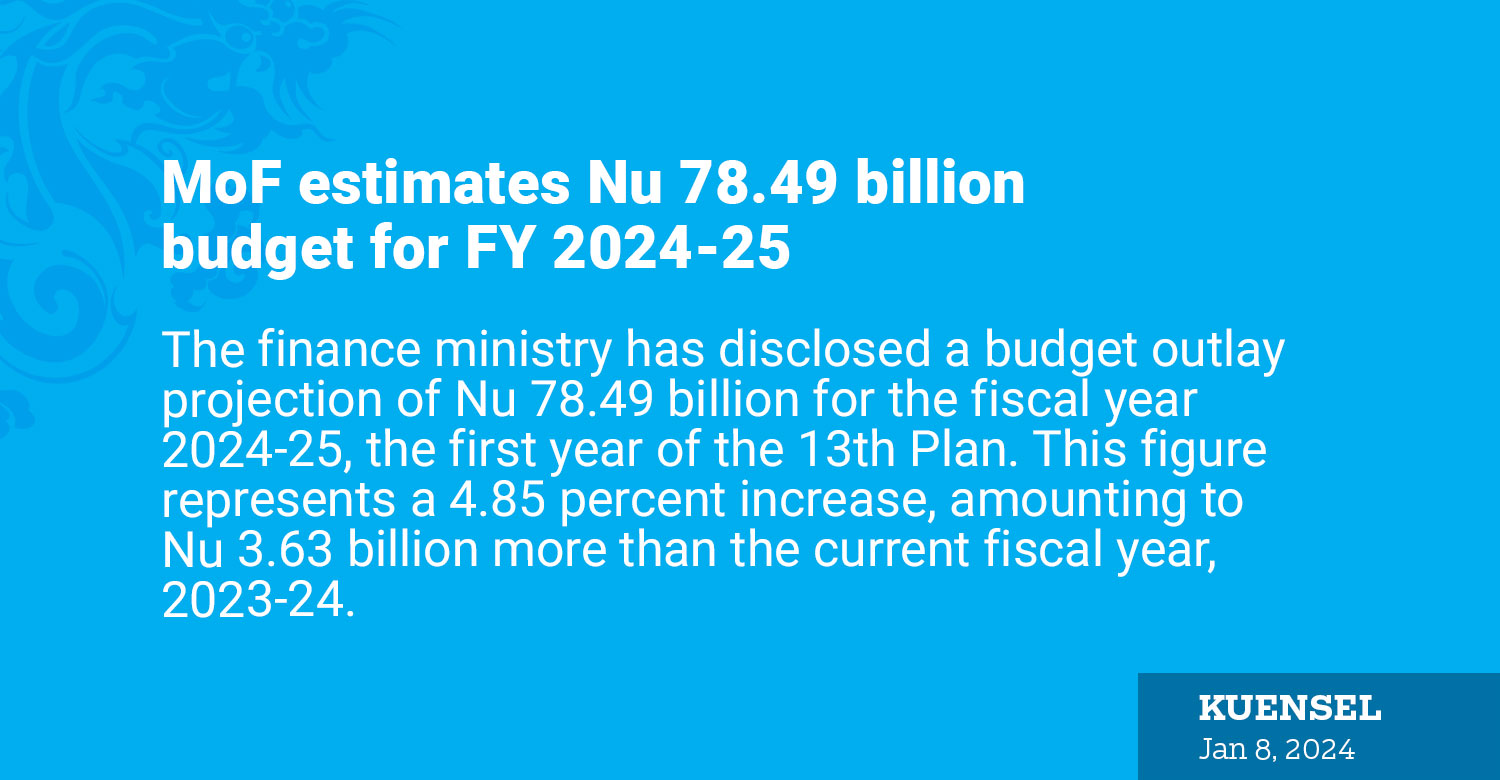
…fiscal deficit projected at 3 percent of GDP or Nu 9.82 billion
The finance ministry has disclosed a budget outlay projection of Nu 78.49 billion for the fiscal year 2024-25, the first year of the 13th Plan. This figure represents a 4.85 percent increase, amounting to Nu 3.63 billion more than the current fiscal year, 2023-24.
Budgetary agencies, including ministries, constitutional bodies, autonomous agencies, dzongkhags, thromdes, and gewogs, have been asked to submit their annual budget proposals in adherence to the fiscal year 2024-25 budget preparation guidelines by March 15 of this year.
The 13th Plan, set to commence in July next year, aspires to transform Bhutan into a high-income country with a GDP of USD 5 billion economy by 2029 and a USD 10 billion economy by 2034. The government has earmarked a budget of Nu 512 billion for the 13th Plan.
The ministry has derived the resource envelope for the fiscal year 2024-25 from the preliminary revenue and expenditure framework for the 13th Plan. The 13th Plan is still in the formulation stage and awaits approval.
The estimated budget allocation includes Nu 48.49 billion for recurrent expenditure, surpassing the capital expenditure of Nu 30 billion.
As mandated by the Constitution, the recurrent budget must be met by domestic revenue.
Compared to the current fiscal year 2023-24, recurrent expenditure sees a rise of Nu 2.94 billion, and the capital budget increases by Nu 687.23 million.
The fiscal deficit for 2024-25 is projected to be 3 percent of the gross domestic product (GDP), equivalent to Nu 9.82 billion. This is a decrease from the Nu 21.35 billion or 9.7 percent of GDP estimated for the current fiscal year. External and domestic borrowings are anticipated to cover this deficit.
To maintain the quality of expenditure through judicious management of limited public resources, budgetary bodies are instructed to align proposals with the results and key performance indicators (KPIs) outlined in the draft 13th Plan. KPIs for mandatory and controllable recurrent budgets must be prepared with the agency’s core objective in mind.
The recurrent budget will be allocated as an annual block grant, categorised under mandatory (pay and allowances, provident fund contribution, stipend, and retirement benefits) and controllable heads. This allocation aims to optimise scarce resources and align the recurrent budget with organisation strategic goals.
Budgetary bodies are required to formulate and submit KPIs and targets for recurrent budget allocation at the agency level.
Separate proposals, featuring detailed estimates, specific KPIs, and distinct targets, are expected for recurring activities not part of operations and maintenance, such as water supply maintenance, road upkeep, medicine procurement, laboratory consumables, animal feed, fertilizers, and annual maintenance fees.
For the capital budget under government financing, budgetary bodies are asked to propose only for the completion of ongoing or spill-over, critical activities and mandatory government counterpart financing with a bearing on public service delivery. However, the budget proposals for new activities are subject to finalisation or approval of the plan and resource mobilisation.
For government of India funded projects, budgetary bodies must submit proposals along with detailed project reports based on the tentative list of projects or activities identified under the government of India for the 13th Plan.
State-owned enterprises (SOEs) requiring government support must route all proposals through the Department of Macro-fiscal and Development Finance under the finance ministry.
These SOEs are required to submit revenue performance details along with financial statements for the past two years and projections for the fiscal year. The department will review the proposals and recommend further action after a thorough examination.












